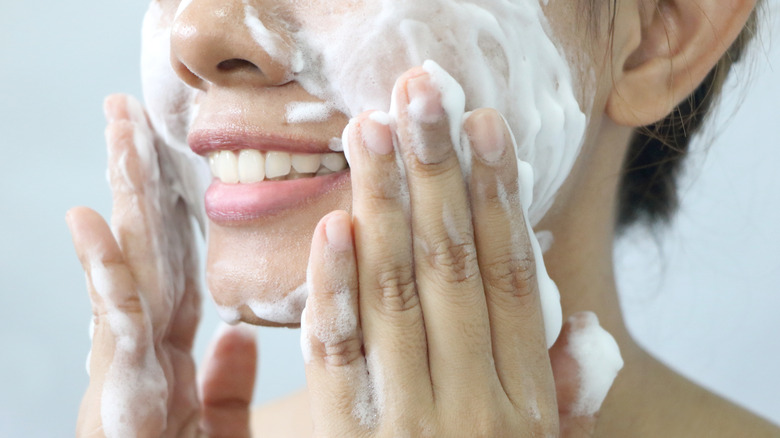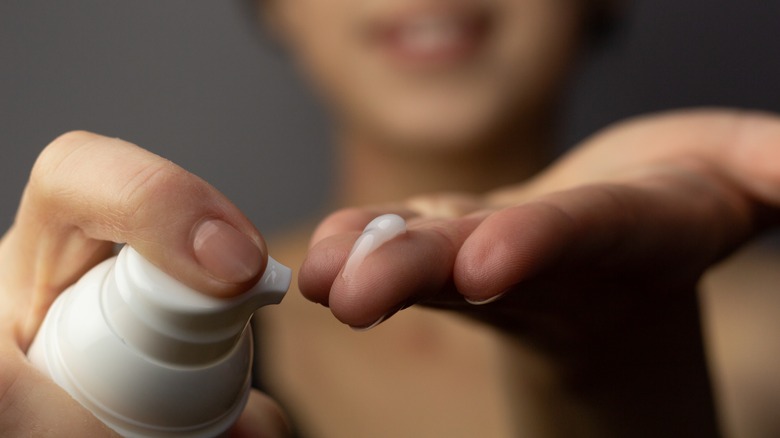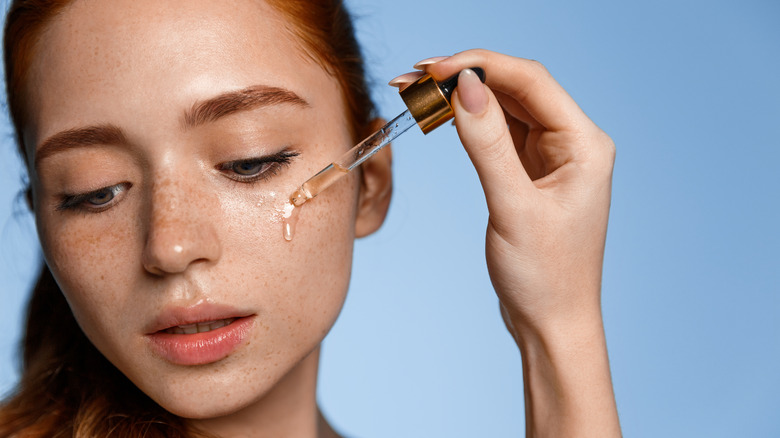Why Your Skin Care Routine Needs To Change Every Season
Developing a solid skin care routine that works for your unique skin isn't always easy. No sooner do you think you have it figured out when a product stops working for you and your skin becomes dry or oily, or you start having acne breakouts out of nowhere. While you may chalk it up to hormones or even worry that the formulations for your favorite skin care brands have changed, it may be something even more simple — the changing seasons. It turns out, more than just your wardrobe needs to be updated when the seasons change. Your skin care routine needs to change every season, too.
Everything from how much moisture is in the air to how harsh the sun's ultraviolet rays are in your region during different times of the year can wreak havoc on your skin if you aren't changing your skin care routine to accommodate weather changes.
Your skin needs cleansing and moisturizing all year round
For most of us, long gone are the days of washing our faces with any old soap (or not washing our faces at all), and leaving it at that. Our skin needs — and deserves — way more than that. But with so many different products to choose from, how do you know where to even start with the most basic of year-round skin care routines?
Dermatologist Carlos Charles told The New York Times what you probably already intuitively know, it all starts with a cleanser. According to Charles, "Our skin comes in contact with environmental pollutants, dirt and other factors each day that should be gently removed."
From there, you may want to add toner, but aesthetician Jordana Mattioli told the publication that it's entirely optional, depending on your skin care needs. If you're going to use it, Mattioli revealed, "Toners should be done after cleansing and before putting on anything else." Then there's moisturizer. "Essentially, moisturizers assist in preventing water loss through the outer layers of skin," Dr. Charles explained. "They can also complement the naturally found protective oils and other building blocks within the skin, such as ceramides."
Skin care is about more than the skin on your face
Once you have a basic routine established for the skin on your face, it's important to remember that you have skin covering the rest of your body — and it needs care too! In an article for WebMD, board-certified dermatologist Brandith Irwin shared that 80% of your skin isn't on your face and keeping it healthy is the secret to aging well. According to Irwin, this means keeping your showers or baths short to avoid drying out your skin, only using cleansers on particularly smelly or sweat-prone areas, gently exfoliating regularly, and making sure to moisturize after every bath or shower.
Whether you think you need to moisturize your whole body or not, Irwin insists you do. "Every day and every time you get out of the bath or slower, lube lube lube your entire body with cream or lotion," she recommends, adding, "If you have dry skin, creams and oils are better for your skin than lotions."
Just like the skin on your face, though, care for the skin on the rest of your body will need a few tweaks throughout the year as the seasons change.
Dry air in the fall and winter months can make your skin dry and tight
Though you may not realize it, the amount of moisture in the air has a direct impact on the amount of moisture in your skin. That same crisp air that signals an end to summer and the beginning of fall can also signal dry skin. Research has shown that not only are the top layers of skin unable to hold onto as much moisture in low humidity conditions (like those in the fall and winter), skin also reacts more strongly to allergens and other irritants during this time, which helps explain why people with certain skin conditions like eczema have more flares in the colder months.
To help combat moisture loss in the fall and winter, you'll want to apply moisturizer when it can do the most good. Dermatologist Alejandra Estemalik explained to the Cleveland Clinic that moisturizers work by trapping moisture in your skin. "When you apply moisturizer on skin that's really, really dry, it's not going to be that helpful because there's no moisture to trap," she said. "Applying moisturizers on damp skin is much more beneficial, especially if your skin is dry to start with."
Cranking up the heat in winter can dry out your skin even more
The outdoor air isn't the only contributor to dry, itchy skin in the cooler months. According to dermatologist Alejandra Estemalik, spending more time indoors in the colder months can also dry out our skin. Estemalik told the Cleveland Clinic, "In winter, environmental humidity is low, but we're also exposed to forced air or heat, which is also going to decrease humidity indoors and cause dry skin."
Harvard dermatologist Daniela Kroshinsky told The Washington Post that while harsh soaps can strip even more oils from your skin, one of the best things you can do for your skin in the winter is turn on a humidifier. "Humidifiers are wonderful," Kroshinsky said, though noted that smaller humidifiers likely aren't very effective at adding moisture to the air throughout your home. Instead, she suggests a high-capacity humidifier and aiming for 45 to 55% relative humidity to offset the drying effect of your heating system in the winter.
Hot showers in the winter can also strip your skin's moisture
Anyone who has spent any amount of time in a place with chilly falls and cold winters knows that there's nothing like a long, hot shower to help get some of the chill out of your bones. Unfortunately, if this is one of your go-to ways to warm up, you're actually making your dry, itchy skin worse.
Dermatologist Alejandra Estemalik explained to the Cleveland Clinic that not only can frequent showers strip your skin's moisture in general, but the temperature of the water also makes a difference. "The warmer water you use, the drier your skin's going to be," Dr. Estemalik revealed. Instead of showering daily, Estemalik recommends limiting your showers to under 10 minutes and only taking one every other day.
In an interview with "Health Minute" out of the University of Utah, dermatologist Emily McKenzie takes it a step further and actually recommends lukewarm showers to help protect your skin. Though if simply the thought of that makes you shiver, she explained that using mild soaps can also help your skin retain moisture.
Foaming cleansers should be avoided if at all possible
The lather you get from foaming cleansers can feel luxurious on your skin at first. Despite how soft they feel when you apply them and how clean your skin feels afterward, though, they're not a great choice for the cold, dry months.
Board-certified dermatologist Joshua Zeichner told Real Simple that while foaming cleansers do a great job of cleaning your skin and removing dirt and oil, they also contain sulfates, which are more likely to dry out your skin than other types of cleansers. The same can be said for salicylic acid-based cleansers. Instead, he recommends switching up your cleanser for something milder in the colder months. "Cleansing creams, balms, and oils can effectively wash the skin while keeping the skin hydrated and not disrupting the skin barrier," Zeichner explained.
If you rely on a foaming or salicylic acid-based cleanser to control acne, at least add a toner or moisturizer designed to counter the drying effects.
Dry skin in the winter can lead to acne breakouts
Acne control products can dry out your skin, yes, but dry skin itself can lead to acne breakouts. That may be why you find yourself in a vicious cycle of trying and failing to get your acne under control in the winter months. In fact, a 2015 study published in the Journal of the American Academy of Dermatology found that rates of moderate to severe acne (in which more than half the face is involved) jumped 11% in participants during winter compared to summer. So what is it about the winter months that help turn dry skin into acne-prone skin?
Dr. Arielle Nagler, an assistant professor of dermatology at New York University's Langone Health, told Time, "The cold and dryness that comes with cold temperatures can cause inflammation, which is one of the main pathogenic factors for acne formation."
Another reason is that your skin is essentially overcompensating for the dry air by producing more sebum (oil) that can lead to clogged pores and more acne. Adding an oil-free moisturizer can help return some moisture to your skin while not adding to the sebum production that may already be in overdrive.
An overnight mask can help your skin in the winter
If you've started to notice that your skin is especially dry at night or first thing in the morning during the colder months, you're not imagining things. Dermatologist Joshua Zeichner told Real Simple that your skin goes through circadian rhythms (changes over a 24-hour cycle) just like the rest of your body. "Skin hydration levels start to decline in the afternoon and continue overnight," he shared, noting that an overnight mask might be just the thing you need to help seal in your night serums and moisturizers to keep your skin hydrated. While a night moisturizer is great for daily use, an overnight mask should be used for more of a boost to your regular moisturizing routine.
Dermatologist Deanne Mraz Robinson told Real Simple that this is because overnight masks have larger concentrations of moisturizing ingredients to work alongside your body's natural repair process while you sleep. If you still have dry skin despite using an overnight mask, Zeichner recommends turning on a humidifier overnight as well.
Increasing humidity and sun exposure in spring can wreak havoc
After being stuck indoors all winter, we tend to flock outside on the first warm spring day but if we're not careful, our skin can pay the price. "In the spring, people are outdoors more, but the weather isn't summer-hot yet, so people discount how strong the sun is and don't protect themselves sufficiently," dermatologist Blair Murphy-Rose told Everyday Health. Believe it or not, this means your risk of sun damage may be even higher in the spring so it's especially important to include sunscreen in your springtime skin care routine.
The increasing humidity in spring also calls for a change to your skin care routine, namely the way you moisturize. While the earlier spring months may still be a bit dry, as the season goes on you'll want to opt for a lighter moisturizer. Dermatologist Michelle Farber told Everyday Health that making the switch to a gel moisturizer (which is lighter than an oil-based moisturizer) is especially important in the spring if you have acne-prone skin and find yourself sweating more.
Exfoliating is a great springtime addition to your skin care routine
While you may decide to avoid harsh exfoliants in the winter months for fear that they will dry out your skin even more, the increasing humidity in the spring and summer make the warmer months a great time to add stronger exfoliants back to your skin care routine, board-certified dermatologist Hadley King told Real Simple. The added humidity during this time helps the skin tolerate acids and strong exfoliants.
Even if chemical exfoliants aren't your thing, adding a physical exfoliant (like a face scrub) or a mechanical exfoliant (like a microderm device) can help give your skin the refresh it needs. "Spring is the prime time to return to exfoliating and brighten the dull skin that has accumulated during winter," King asserted. Just be mindful of overdoing it, which can cause a problem no matter the time of year.
Watch out for oil and sweat buildup in the summer
While our skin naturally produces oil year round, excess sweat in the warmer months can cause that oil to build up on our skin. According to dermatologist Melanie Palm, changes to the environment in summer can cause our sebaceous glands (those that produce oil) to go into overdrive. Palm told Forbes that this can cause your skin to become oily, particularly on your face. She explained, "Facial skin has the most concentrated number of sebaceous glands, [so] the shine shows most prominently there."
To combat the oily, sweaty buildup in the summer, Palm suggests avoiding products that have a heavy emollient base and instead opting for lightweight products. She also warns against falling into the trap of over-cleansing your face, because this can dry your skin out too much and cause your skin to produce even more oil to compensate. Instead, she advises removing oil with botting paper or a tissue and drinking plenty of water.
Even more sun exposure in warmer months calls for even more sunscreen in your routine
While you should be using sunscreen as part of your skin care routine year round, it's even more important in the warmer months. Not only are you likely to spend more time in the sun during these months — hanging out on the beach or by the pool or getting together with friends for a cookout — the sun's ultraviolet rays are also stronger in the summer months, making them more dangerous for your skin.
According to dermatologist Anna Chien for Johns Hopkins Medicine, your year-round, everyday sunscreen should have a sun protection factor (SPF) of at least 30, but if you're spending a lot of time outdoors, opt for an SPF of at least 60. "In reality, most people do not use as much sunscreen as they should, and this higher SPF helps compensate for the reduced application," she revealed.
So just how much sunscreen should you be using, ideally? According to Chien, you'll need about an ounce to cover your limbs, face, and neck. If you're wearing a back or midriff-baring swimsuit, or even a low-cut top that leaves more of your chest exposed, you're going to need even more.
Sun exposure can make you more sensitive to retinol and retinoids
You've likely seen plenty of products touting retinoids or retinol as part of their ingredients, but you may not fully understand what they are or how they work. According to the American Academy of Dermatology, retinoids is a catch-all term for various vitamin A-based skin care products (retinol is another term for vitamin A). They are used to treat acne as well as for their anti-aging properties, which work by helping skin cells turn over more quickly. Because of this, however, they make your skin more sensitive — particularly to the sun — which means you may need to adjust your use of them in your skin care routine during the summer months.
"Summer is when people start noticing more irritation from their retinol/retinoid," dermatologist Karan Lal told InStyle. "It is for this reason, I recommend either reducing the frequency of use or being more aggressive about sunscreen [in the summer]."
Dermatologist Anne Chapas told the American Academy of Dermatology that the percentage of retinol doesn't have to be disclosed for over-the-counter products, so she also advises using the lowest formulation you can find to avoid skin irritation.
Vitamin C serum can help protect your skin from hyperpigmentation
While not everyone needs to include serum as part of their skin care routine, you may benefit from adding a vitamin C serum to your routine — especially in the summer months — if you're prone to hyperpigmentation. Vitamin C is beneficial for combating hyperpigmentation like sunspots and age spots because it slows down melanin production, but that's not all it can do for your skin.
According to Healthline, vitamin C can also help hydrate your skin, promote collagen production, help prevent skin sagging, reduce those dark circles under your eyes, and may even help soothe sunburns if you haven't been as diligent about your sunscreen as you should. Research has also found that it's safe for most skin types and has antioxidant properties. Still, like anything you put on your skin, you should always test for any reactions before applying a vitamin C serum widely, no matter the time of year.














